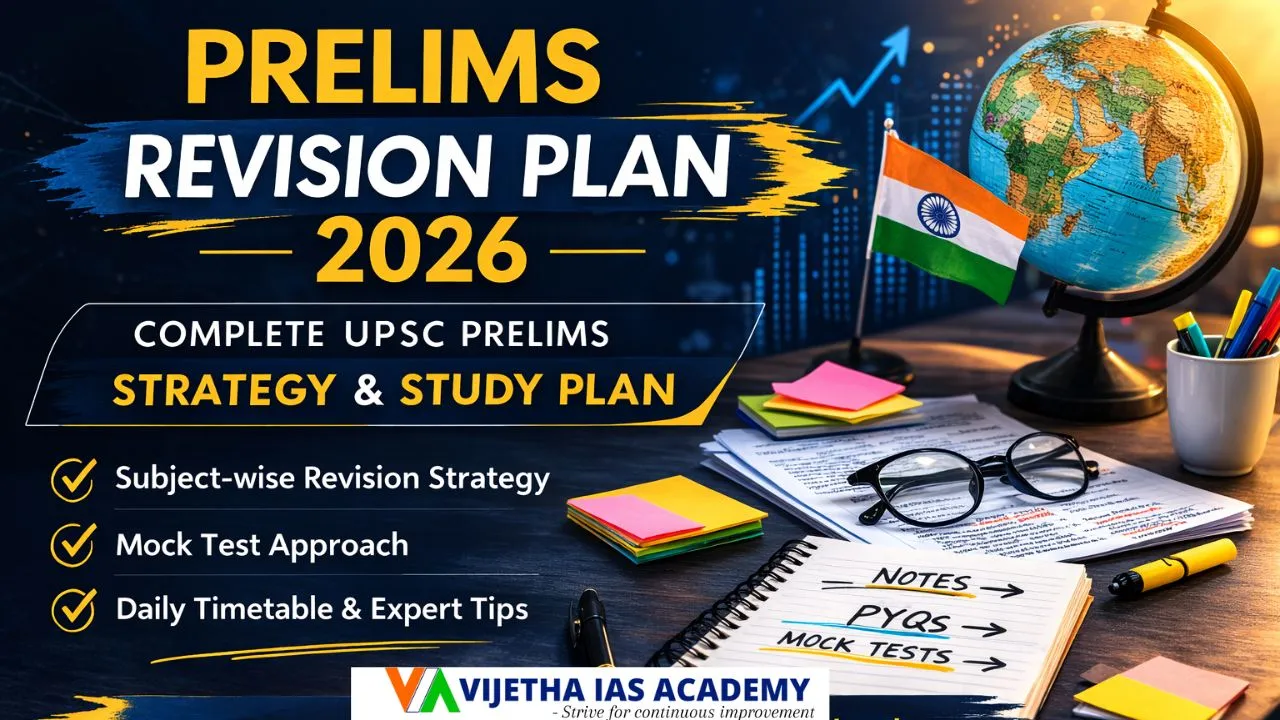
Prelims Revision Plan 2026 – Complete UPSC Prelims Strategy & Study Plan
Prelims Revision Plan – Strategy to Crack UPSC Prelims in First Attempt
Preparing for the Civil Services Examination is not just about studying new topics; it is more about revising what you have already studied. A well-structured Prelims Revision Plan can make the difference between clearing the cutoff and missing it by a few marks. Many aspirants read multiple sources but fail to consolidate their preparation. Therefore, a strategic UPSC Prelims revision strategy becomes extremely important.
In this article, we will discuss a practical and result-oriented Prelims revision plan, daily timetable, subject-wise approach, mock test strategy, and important FAQs.
Why is a Prelims Revision Plan Important?
UPSC Prelims is unpredictable. Questions are conceptual, analytical, and often interconnected. Without proper revision:
- Static subjects become confusing
- Current affairs remain scattered
- Silly mistakes increase
- Time management suffers
A strong UPSC Prelims revision plan ensures retention, clarity, and confidence.
For official syllabus and pattern, always refer to the official website of Union Public Service Commission.
Click here-https://upsconline.nic.in/
60-Day Prelims Revision Plan
Phase 1: First 30 Days – Consolidation Phase
Focus: Static subjects + Short notes revision
Subjects to Cover:
- Polity
- Modern History
- Geography
- Economy
- Environment
- Science & Technology
Strategy:
- Revise one major subject every 4–5 days.
- Solve previous year questions (PYQs) alongside revision.
- Highlight weak areas.
- Make micro-notes for quick recall.
Tip: Revise from limited sources. Do not start new books at this stage.
Phase 2: Next 20 Days – Testing Phase
Focus: Full-Length Mock Tests + Current Affairs
- Attempt 2–3 full-length mock tests per week.
- Analyse each test for at least 4–5 hours.
- Maintain an “Error Notebook”.
- Revise current affairs of last 1.5 years.
A proper Prelims revision plan must include mock analysis. Without analysis, mock tests are useless.
Phase 3: Last 10 Days – Rapid Revision Phase
Focus: Only revision, no new content.
- Revise short notes daily.
- Practice CSAT comprehension and reasoning.
- Revise important schemes, constitutional articles, maps, and environmental conventions.
Sleep properly and maintain mental calmness.
Subject-Wise Prelims Revision Strategy
1. Polity Revision Plan
- Revise Constitutional Articles.
- Focus on Parliament, Judiciary, President, Federalism.
- Solve at least 25–30 PYQs from Polity.
Polity is scoring if revised properly.
2. History Revision Plan
- Create timeline charts.
- Focus on Modern India (1857–1947).
- Revise important Acts and Committees.
- Practice elimination technique in Ancient and Medieval questions.
3. Geography Revision Plan
- Practice map-based questions.
- Revise physical geography concepts (winds, currents, climate).
- Focus on Indian Geography and locations in news.
4. Environment & Ecology Revision
- Revise National Parks and Biosphere Reserves.
- Focus on Climate Change conventions.
- Study government schemes related to environment.
Environment is highly dynamic and important in every Prelims revision plan.
5. Economy Revision Plan
- Revise basic concepts like GDP, Inflation, Repo Rate.
- Focus on Budget and Economic Survey highlights.
- Practice statement-based questions.
Daily Timetable for Prelims Revision
Here is a simple daily schedule:
Morning (3 Hours): Static Subject Revision
Afternoon (2 Hours): Current Affairs Revision
Evening (2 Hours): PYQs / Mock Test Practice
Night (1 Hour): Quick Revision of Short Notes
Total: 8 Hours effective study
Consistency is more important than long study hours.
Mock Test Strategy in Prelims Revision Plan
A strong UPSC Prelims revision strategy must include:
- Minimum 25–30 full-length mock tests
- Detailed error analysis
- Tracking accuracy rate
- Improving elimination technique
Aim for 90+ marks in mock tests consistently.
Common Mistakes During Prelims Revision
- Reading new books at last moment
- Ignoring CSAT
- Not analysing mock tests
- Studying randomly without plan
- Over-stressing in last week
Avoid these mistakes to improve your success chances.
Check this also - Most Important Topics for UPSC Prelims 2026
FAQs on Prelims Revision Plan
Q1. How many times should I revise before UPSC Prelims?
Ideally, at least 3–4 revisions of core subjects are necessary. A proper Prelims revision plan ensures multiple revisions.
Q2. Is 60 days enough for UPSC Prelims revision?
Yes, if your basic preparation is complete. A structured UPSC Prelims revision strategy can make 60 days highly productive.
Q3. How many mock tests should I attempt?
Minimum 25 full-length mock tests along with sectional tests.
Q4. Should I read new current affairs in the last week?
No. Only revise what you have already studied.
Q5. How to improve accuracy in Prelims?
Practice elimination technique, revise concepts clearly, and analyse mistakes from mock tests.
Final Words
UPSC Prelims is not about reading everything; it is about revising the right things multiple times. A disciplined and structured Prelims revision plan improves retention, boosts confidence, and increases accuracy.
Stay consistent. Revise smartly. Trust your preparation.
If you follow this UPSC Prelims revision strategy sincerely, clearing Prelims will become achievable.
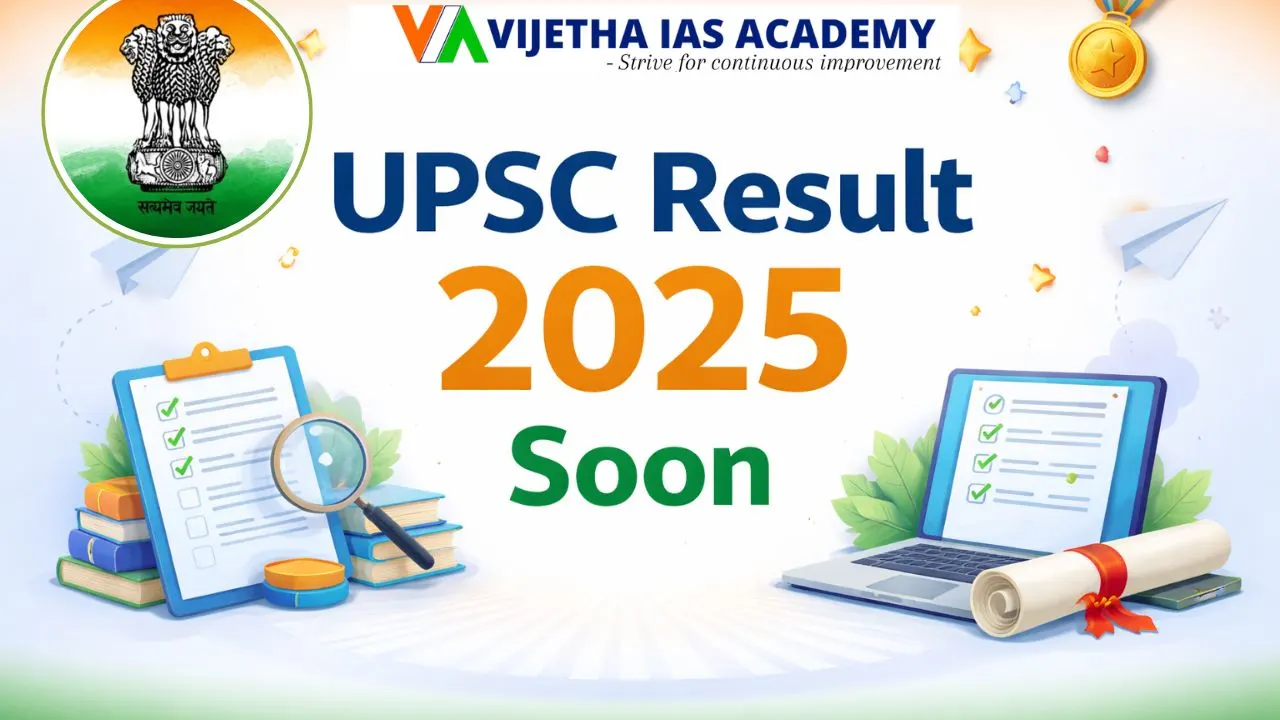
UPSC Final Result 2025 Soon
UPSC Final Result 2025 Soon | Expected Date & PDF Link
Candidates who appeared for the Civil Services Examination 2025 are eagerly waiting for the UPSC Final Result 2025. As per previous year trends, the final result is expected to be released in the first week of March 2026 on the official website of the Union Public Service Commission.
UPSC Final Result 2025 – Expected Date
Based on previous trends:
- UPSC Mains 2025 Result: Declared on 11 November 2025
- Personality Test: Conducted between January–February 2026
- UPSC Final Result 2025: Expected in the first week of March 2026
The result will be published in PDF format on the official website:
https://www.upsc.gov.in
The final merit list will contain:
- Roll Numbers
- Names of qualified candidates
- All India Rank (AIR)
The declaration of the final result marks the completion of the three-stage selection process:
Prelims → Mains → Interview
UPSC CSE 2025 – Overview
|
|
|
|
|
|
|
|
|
|
|
|
|
|
|
|
|
|
|
|
|
|
|
|
|
|
|
|
|
|
How to Download UPSC Final Result 2025 PDF?
Follow these simple steps:
- Visit the official UPSC website – upsc.gov.in
- Click on the “What’s New” section.
- Select UPSC Final Result 2025.
- Download the PDF file.
- Use CTRL + F to search your Roll Number or Name.
The PDF will remain available for download for future reference.
UPSC Toppers List 2024 (Previous Year Reference)
The UPSC Result 2024 was declared on 22 April 2025. The topper secured AIR 1 and set an inspiring benchmark for future aspirants.
Here are the Top 10 candidates of UPSC CSE 2024:
|
|
|
|
|
|
|
|
|
|
|
|
|
|
|
|
|
|
|
|
|
|
|
|
|
|
|
|
|
|
|
|
|
These toppers cleared all three stages — Prelims, Mains, and Interview — with consistent strategy and disciplined preparation.
At Vijetha IAS Academy, we analyse topper strategies and integrate them into our structured mentorship and test series programmes.
UPSC Vacancy 2025 Details
The total number of vacancies for UPSC 2025 is approximately 979.
Category-Wise Vacancy Highlights:
- Total Vacancies: 979
- PwBD Reserved: 38
- Blindness & Low Vision – 12
- Deaf & Hard of Hearing – 7
- Locomotor Disability & Related – 10
- Multiple Disabilities – 9
Reservations for SC, ST, OBC, EWS, and PwBD are provided as per Government of India norms.
Final vacancy numbers may slightly vary after confirmation from Cadre Controlling Authorities.
What Happens After UPSC Final Result 2025?
Once the final merit list is declared:
Appointment Letters
The Department of Personnel and Training (DoPT) issues appointment letters.
Foundation Course
Selected candidates undergo the Foundation Course at:
- Lal Bahadur Shastri National Academy of Administration – For IAS probationers
- Sardar Vallabhbhai Patel National Police Academy – For IPS officers
- Foreign Service Institute – For IFS officers
Service & Cadre Allocation
Allocation depends on:
- Rank secured
- Service preference
- Category
- Vacancy availability
Higher rank generally gives better chances of preferred service and cadre.
UPSC Cut Off Trends (2020–2024)
Understanding cut-off trends helps aspirants estimate safe scores.
|
|
|
|
|
|
|
|
|
|
|
|
|
|
|
|
|
|
|
|
|
|
|
|
|
|
|
|
|
|
|
|
|
|
|
|
|
|
|
|
|
|
Cut-offs fluctuate due to:
- Difficulty level of paper
- Number of candidates
- Vacancy count
- Reservation norms
UPSC Notification 2026 – Important Update
While candidates await the UPSC Final Result 2025, many aspirants are already preparing for the UPSC Notification 2026.
The UPSC Notification 2026 is expected to be released in February 2026, along with:
- Official exam calendar
- Vacancy details
- Eligibility criteria
- Important dates
Serious aspirants should begin preparation early rather than waiting for the notification release.
Final Words
The UPSC Final Result 2025 is expected in the first week of March 2026. Candidates are advised to regularly check the official website of the Union Public Service Commission for authentic updates.
Meanwhile, aspirants targeting UPSC 2026 should focus on:
- Building strong fundamentals
- Revising NCERTs
- Practising answer writing
- Analysing previous year papers
- Joining a structured mentorship programme
Success in UPSC is not accidental — it is the result of consistent effort, smart strategy, and right guidance.
For expert mentorship and structured preparation for UPSC Notification 2026, connect with Vijetha IAS Academy today and take your preparation to the next level.
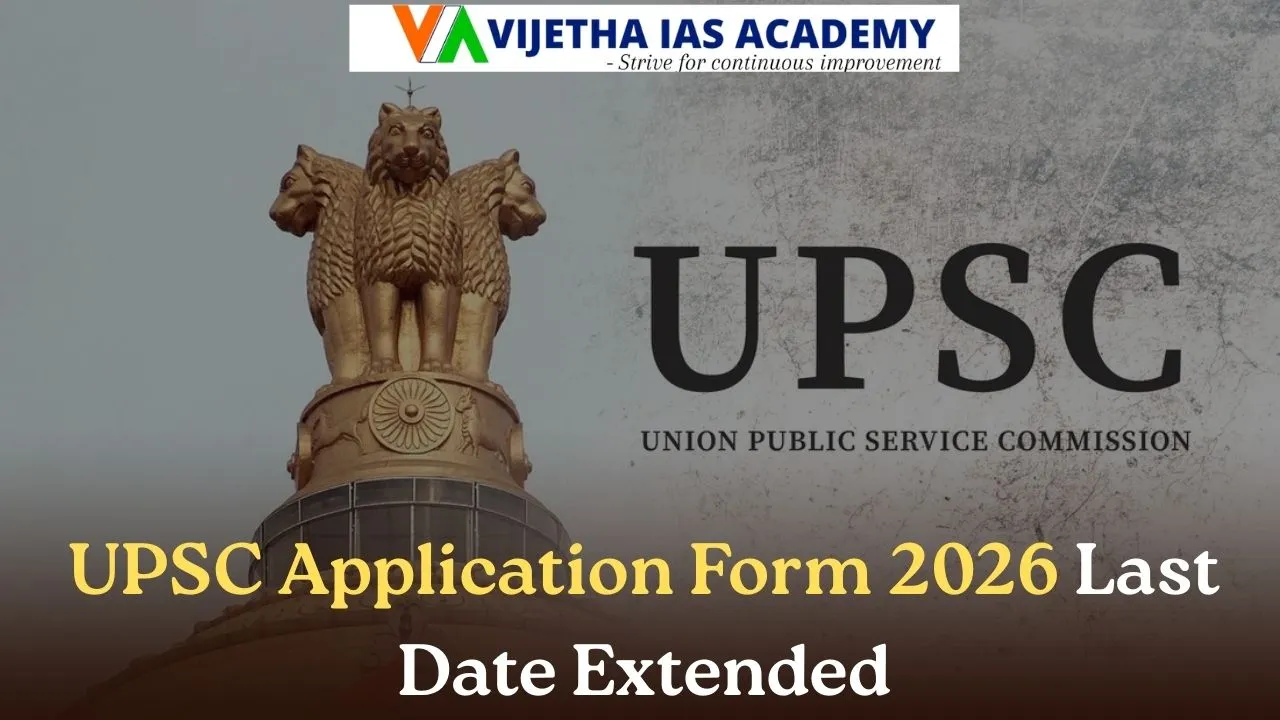
UPSC Application Form 2026 Last Date Extended
UPSC Application Form 2026 Last Date Extended
The UPSC Application Form 2026 has been officially released along with the UPSC Notification 2026 on the official website of the Union Public Service Commission. Candidates preparing for the Civil Services Examination (CSE) 2026 must take note that the last date to apply online, which was earlier 24 February 2026 (6:00 PM), has now been extended for three days till 27 February 2026 (6:00 PM IST).
At Vijetha IAS Academy, we strongly advise all aspirants not to wait until the last minute and complete their registration well before the deadline.
Important Update: UPSC Application Form 2026 Last Date Extended
- Notification Release Date: 04 February 2026
- Application Start Date: 04 February 2026
- Old Last Date: 24 February 2026 (6:00 PM)
- New Extended Last Date: 27 February 2026 (6:00 PM IST)
- Official Website: upsc.gov.in / upsconline.gov.in
This extension provides relief to many candidates who were unable to complete the form earlier. However, candidates must complete the UPSC Apply Online 2026 process before the revised deadline.
What is Included in UPSC Notification 2026?
The UPSC Notification 2026 contains:
- Total number of vacancies
- Eligibility criteria
- UPSC age limit
- Educational qualification
- Reservation rules
- Exam pattern and syllabus
- Application process
- Important dates
Candidates must carefully read the notification before applying.
Pre-Requisites for UPSC Application Form 2026
Before applying for UPSC CSE 2026 Prelims, ensure you have:
- Active Mobile Number
- Active Email ID
- Graduation Certificate Details
- Recent Passport Size Photograph (JPG, 20–300 KB)
- Scanned Signature (JPG, 20–300 KB)
- Valid Photo ID (PDF, 20–300 KB)
Stages of UPSC Apply Online 2026
The application process consists of multiple stages:
- Account Creation (OTR – One Time Registration)
- Common Application Form
- Apply for Examination
- Detailed Application Form (DAF)
- Fee Payment & Document Upload
Steps to Fill UPSC Application Form 2026
The form is divided into Part I, Part II, Part III, and Part IV.
Part I – OTR Registration
Steps:
- Visit the official UPSC website.
- Click on “Apply Online”.
- Select “Online Application for Various Examinations”.
- Click on “Part I Registration”.
- Fill in personal details (Name, DOB, Gender, Nationality, etc.).
- Enter educational qualifications.
- Provide ID details and exam centre preference.
- Preview and Submit.
- Receive Registration ID (RID).
Part II – Application Form Submission
- Login using Registration ID and Date of Birth.
- Pay application fee.
- Select exam centre.
- Upload Photograph, Signature & Photo ID.
- Submit final declaration.
You will receive confirmation via SMS and email after successful submission.
Part III – Detailed Application Form (DAF)
This stage is mandatory only for candidates who qualify Prelims.
- Fill service preferences
- Provide detailed academic information
- Submit required documents
Part IV – Fee Payment & Upload
UPSC Application Fees 2026
- ₹100 for General / EWS / OBC candidates
- No Fee for SC / ST / Female / PwBD candidates
Payment Modes:
- Online Banking
- Debit/Credit Card
- SBI Challan (Cash Mode)
UPSC Age Limit 2026
As per UPSC Notification 2026:
- Minimum Age: 21 years
- Maximum Age: 32 years (General Category)
Age Relaxation:
- OBC – 3 Years
- SC/ST – 5 Years
- PwBD – 10 Years
Candidates must check the detailed UPSC age limit criteria mentioned in the official notification before applying.
Eligibility Criteria for UPSC CSE 2026
Educational Qualification
- Bachelor’s Degree from a recognized university.
Nationality
- Must be an Indian citizen (for IAS & IPS).
Why You Should Not Delay Your UPSC 2026 Application
Many aspirants make these mistakes:
- Uploading incorrect document size
- Wrong category selection
- Incorrect exam centre choice
- Waiting till last date (server issues)
At Vijetha IAS Academy, we guide students step-by-step through the application process to avoid errors.
Common Mistakes to Avoid While Filling UPSC Form
✔ Double check personal details
✔ Ensure correct photo format
✔ Verify category & age relaxation eligibility
✔ Save Registration ID safely
✔ Submit before deadline
How Vijetha IAS Academy Helps You in UPSC 2026
Vijetha IAS Academy provides:
- Complete guidance on UPSC Notification 2026
- Clarity on UPSC age limit
- Prelims + Mains Integrated Coaching
- Anthropology Optional Coaching
- Test Series & Mentorship
- Application form assistance
If you are serious about UPSC 2026, this is the right time to begin your structured preparation.
FAQs
1. What is the last date to apply for UPSC CSE 2026?
The last date has been extended to 27 February 2026 (6:00 PM IST).
2. What is the application fee for UPSC 2026?
₹100 for General, EWS, OBC candidates. No fee for SC/ST/Female/PwBD candidates.
3. What is the UPSC age limit for 2026?
Minimum age: 21 years
Maximum age: 32 years (General category), with relaxation for reserved categories.
4. Can I edit the application form after submission?
No, editing is not allowed after final submission. Carefully preview before submitting.
5. Is OTR mandatory for UPSC Application?
Yes. One Time Registration (OTR) is compulsory before applying for the exam.
6. When will UPSC Prelims 2026 be conducted?
The exam date is mentioned in the UPSC Notification 2026. Candidates should regularly check official updates.
Final Words
The extension of the UPSC Application Form 2026 deadline till 27 February 2026 offers a final opportunity for serious aspirants. Do not delay your registration.
Carefully read the UPSC Notification 2026, check the UPSC age limit, confirm eligibility, and submit your application on time.
For complete UPSC CSE 2026 guidance, mentorship, and optional coaching, connect with Vijetha IAS Academy today and start your journey toward becoming a Civil Servant.
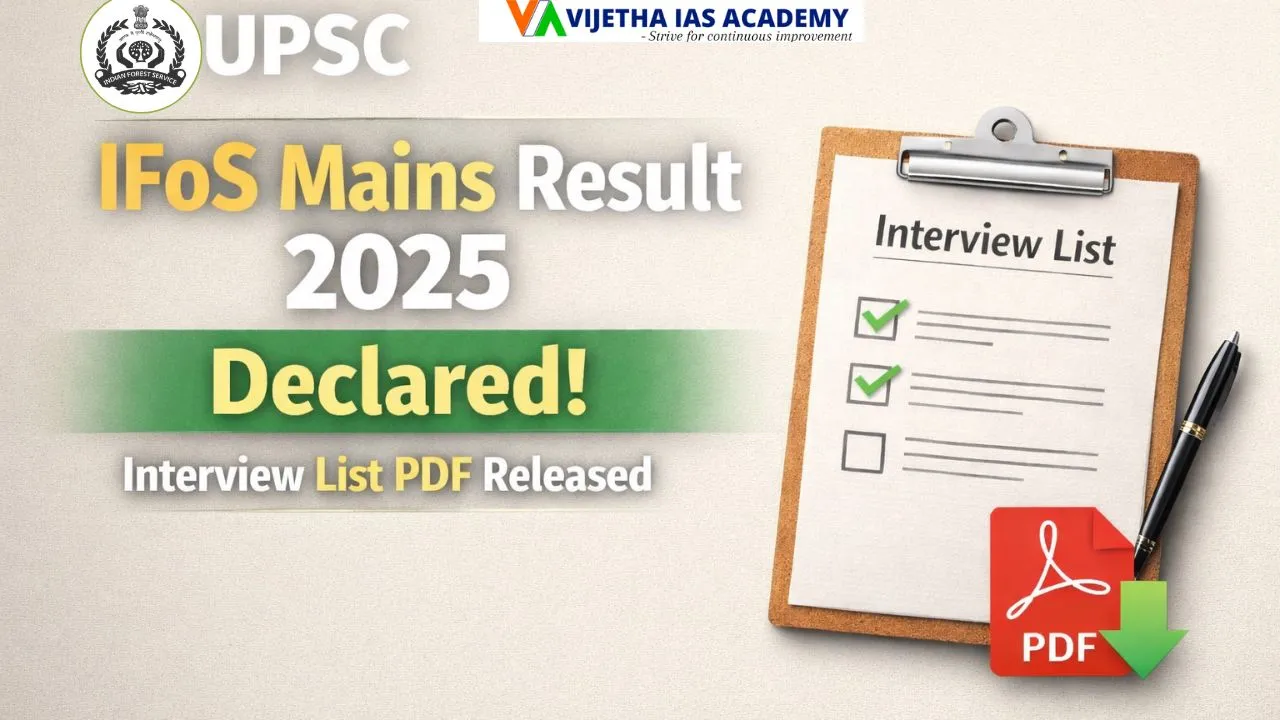
UPSC IFoS Mains Result 2025 Declared – Interview List PDF Released
IFoS Mains 2025 Result Out – Check UPSC Interview Selection List
The Union Public Service Commission (UPSC) has officially declared the Indian Forest Service (IFoS) Mains Result 2025 on 24 February 2026. Candidates who appeared for the written examination held from 16 November to 23 November 2025 can now check their qualification status for the next stage — the Personality Test (Interview).
At Vijetha IAS Academy, we congratulate all aspirants who have successfully cleared the written stage and are now eligible for the IFoS Interview 2025.
Download Official Result PDF
Click Here to Download IFoS Mains Result 2025 PDF
(Candidates are advised to check their roll number carefully in the official list released by UPSC.)
IFoS Mains 2025 Result: What It Means for Candidates
The result contains the roll numbers of candidates shortlisted for the Indian Forest Service Personality Test 2025. However, the candidature is purely provisional, subject to verification of eligibility conditions such as:
- Age criteria
- Educational qualification
- Reservation claims (SC/ST/OBC/EWS/PwBD)
- Submission of required documents
The interviews will be conducted at UPSC Office, Dholpur House, Shahjahan Road, New Delhi.
Detailed interview schedules and e-Summon Letters will be uploaded on the official UPSC websites:
Mandatory OAF Update Window for IFoS 2025
As per the Indian Forest Service Examination Rules 2025, UPSC has provided a mandatory 15-day window for candidates qualified for the Personality Test.
OAF Update Period: 27 February 2026 to 13 March 2026 (till 6:00 PM)
During this period, candidates must:
- Update educational qualification details
- Upload proof of passing the required degree
- Update permanent and correspondence address
- Submit employment details (if applicable)
- Provide achievement details
- Confirm previous attempts
- Submit OBC/EWS Annexure (if applicable)
Failure to complete the OAF update within the prescribed timeline will lead to cancellation of candidature.
At Vijetha IAS Academy, we strongly advise candidates to complete this step well before the deadline to avoid last-minute issues.
Cadre Preference Rules for IFoS 2025
Cadre allocation is one of the most crucial stages in the Indian Forest Service selection process. Candidates will be required to indicate their order of preference for State Cadres, including their Home State.
Once submitted, no change in cadre preference will be allowed. Allocation will be done as per the cadre policy in force at the time of final result declaration, considering:
- Candidate’s rank
- Category
- Cadre preference
When Will IFoS 2025 Marks Be Released?
UPSC will upload the marksheets of all candidates within 15 days after the final result declaration (post interviews). The marks will remain available for 30 days on the official website.
How to Prepare for IFoS Interview 2025?
The Personality Test is not a mere formality. It evaluates:
- Administrative maturity
- Environmental awareness
- Decision-making ability
- Leadership qualities
- Depth of subject understanding
At Vijetha IAS Academy, we provide structured guidance for both UPSC Indian Forest Service Mains Result 2025 updates and interview preparation. Our mentorship programme focuses on mock interviews, DAF analysis, environmental current affairs and personality development.
Candidates preparing seriously for IFoS Interview Preparation 2025 must stay updated with official notifications and adopt a strategic approach.
Check this also- Indian Forest Service Salary 2026
Final Words
Congratulations to all candidates who have qualified for the IFoS Interview 2025. This is a significant milestone in your civil services journey. Stay disciplined, complete all documentation formalities on time, and prepare confidently for the Personality Test.
For expert guidance and structured mentorship for UPSC and IFoS, stay connected with Vijetha IAS Academy.

Indian Forest Service Salary 2026 – Ranks, Allowances & Job Profile
Indian Forest Service Salary 2026: Ranks, Allowances, Job Profile & Salary Structure
The Indian Forest Service Salary 2026 reflects the prestige, responsibility, and authority associated with one of India’s premier All India Services. Officers selected through the IFoS examination conducted by the Union Public Service Commission receive attractive pay, multiple allowances, and long-term career growth.
At Vijetha IAS Academy, we guide aspirants not only about exam preparation but also about the career prospects and salary structure of IFoS officers.
Let us understand the complete Indian Forest Service Salary 2026, including ranks, promotions, allowances, and job profile.
Indian Forest Service Salary 2026 Per Month
The starting Forest Officer Salary 2026 begins at:
₹56,100 per month (Basic Pay – Junior Time Scale)
The highest salary under the Indian Forest Service Salary 2026 structure reaches:
₹2,25,000 per month (Apex Scale – Head of Forest Force / Director-General of Forests)
The salary increases with promotions after 5, 8, 12, 16, 20 and 25+ years of service.
Indian Forest Service Ranks and Salary Structure
The Indian Forest Service Ranks and Salary depend on seniority and experience.
|
|
|
|
|
|
|
|
|
|
|
|
|
|
|
|
|
|
|
|
|
|
|
|
|
|
|
|
|
|
|
|
|
|
|
|
|
|
|
|
|
|
|
|
|
|
|
|
|
|
This structured hierarchy makes the IFoS Salary 2026 highly competitive among civil services.
IFoS Allowances 2026
Apart from the basic Indian Forest Service Salary 2026, officers receive multiple allowances:
1️⃣ Dearness Allowance (DA)
Revised periodically to offset inflation.
2️⃣ House Rent Allowance (HRA)
Varies depending on posting location (metro, urban, rural).
3️⃣ Transport Allowance
Given to cover official travel expenses.
4️⃣ City Compensatory Allowance
Provided for officers posted in high-cost cities.
5️⃣ Medical Allowance
Covers healthcare expenses for officers and their families.
6️⃣ Leave Travel Concession (LTC)
Allows travel benefits for family during specified periods.
These benefits significantly increase the overall IFoS Salary 2026 package.
IFoS Job Profile and Responsibilities
The IFoS Job Profile is dynamic and prestigious. Officers play a critical role in environmental protection and forest governance.
Key Responsibilities:
- Forest conservation and afforestation planning
- Wildlife protection and anti-poaching enforcement
- Biodiversity conservation
- Management of National Parks and Wildlife Sanctuaries
- Implementation of forest laws
- Disaster management in forest regions
- Policy planning for sustainable development
IFoS officers serve as custodians of India’s ecological balance.
Perks and Benefits of Indian Forest Service Officers
In addition to the Indian Forest Service Salary 2026, officers enjoy:
- Official accommodation
- Government vehicle (as per rank)
- Pension after retirement
- Educational leave for higher studies
- Job security and prestige
Career Growth in IFoS
The promotion path in the Indian Forest Service Ranks and Salary structure ensures:
- Steady pay increases
- Administrative authority
- Leadership positions at state and central levels
Over time, officers may also serve in international environmental organisations or policy advisory roles.
Why IFoS is a Prestigious Career?
The Forest Officer Salary 2026 is attractive, but beyond salary, the service offers:
- Environmental impact
- Administrative authority
- Public respect
- Long-term financial security
Read this for More info- UPSC IFoS Result 2025 Out Soon
FAQs on Indian Forest Service Salary 2026
Q1. What is the starting Indian Forest Service Salary 2026?
The starting basic pay is ₹56,100 per month.
Q2. What is the highest IFoS Salary 2026?
The highest salary reaches ₹2,25,000 per month at Apex Scale.
Q3. Do IFoS officers receive allowances?
Yes, they receive DA, HRA, Transport Allowance, LTC, and medical benefits.
Q4. Is IFoS salary equal to IAS salary?
At entry level, pay scales are similar under the 7th Pay Commission structure.
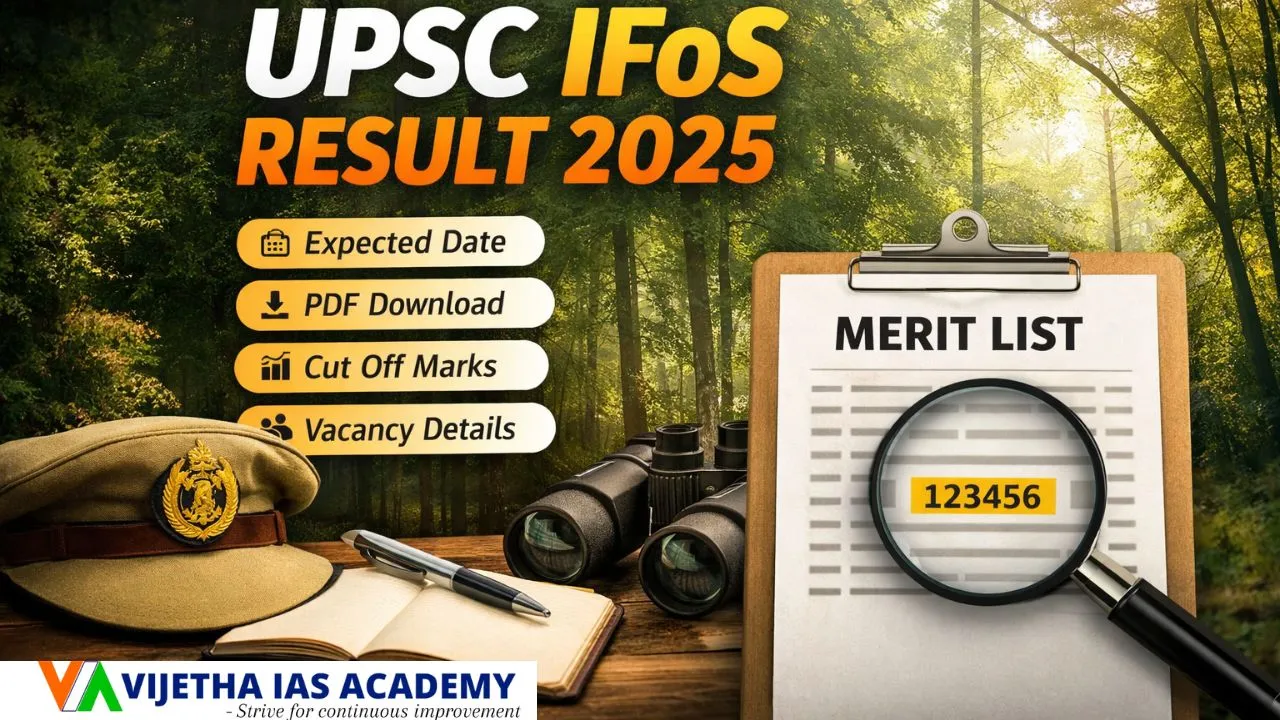
UPSC IFoS Result 2025 Out Soon – PDF Download, Expected Date & Cut Off
UPSC IFoS Result 2025 Out Soon – PDF Download, Expected Date & Cut Off
UPSC IFoS Result 2025 is expected to be released soon by the Union Public Service Commission on its official website, UPSC. Candidates who appeared for the Indian Forest Service Examination 2025 are eagerly awaiting the result PDF to be published on upsc.gov.in.
As per previous trends, the UPSC IFoS Result 2025 is likely to be announced shortly after the completion of the evaluation process. The result will determine the candidates shortlisted for the next stage of the selection process.
According to experts at Vijetha IAS Academy, aspirants should keep checking the official website regularly for updates.
UPSC IFoS Result 2025 Overview
The Indian Forest Service (IFoS) Examination 2025 is conducted at the national level. The result will be released in PDF format containing the roll numbers of qualified candidates.
|
|
|
|
|
|
|
|
|
|
|
|
|
|
|
|
|
|
|
|
|
|
|
|
UPSC IFoS Result 2025 PDF Download Link
The UPSC IFoS Result 2025 PDF will be made available on the official website once declared. Candidates can download the result and check their roll number in the merit list.
The result will be released stage-wise:
- Prelims Result
- Mains Result
- Final Result (Merit List)
Once officially announced, candidates can follow the direct link on the UPSC homepage.
Steps to Download UPSC IFoS Result 2025
Follow these steps to download the UPSC IFoS Result 2025:
- Visit the official website – upsc.gov.in
- Click on the “What’s New” section on the homepage
- Select the link titled “Indian Forest Service Examination 2025 Result”
- The result PDF will open on the screen
- Press Ctrl + F and enter your roll number
- Download and save the PDF for future reference
Vijetha IAS Academy advises candidates to keep a copy of the result for documentation during the interview stage.
UPSC IFoS Vacancy 2025
As per official notification, approximately 150 vacancies are expected under the Indian Forest Service Examination 2025. However, the number of posts may vary based on administrative requirements.
Vacancies are distributed across categories including:
- General
- OBC
- SC
- ST
- EWS
- PwBD
PwBD category includes:
- Low Vision
- Hard of Hearing
- Locomotor Disability
Candidates are advised to check category-wise distribution carefully before final selection.
UPSC IFoS Cut Off 2025 (Expected)
The UPSC IFoS Cut Off 2025 will be released after the declaration of the final result. Cut-off marks depend on:
- Number of vacancies
- Difficulty level of the examination
- Number of candidates appearing
- Overall performance of aspirants
Previous Year Cut Off (2024 Reference)
|
|
|
|
|
|
|
|
|
|
|
|
|
|
|
|
|
|
|
|
|
|
|
|
|
|
|
|
|
|
|
|
|
|
|
Based on trends, the UPSC IFoS Cut Off 2025 is expected to remain in a similar range unless there is a significant change in paper difficulty.
What After UPSC IFoS Result 2025?
After the declaration of the UPSC IFoS Result 2025, shortlisted candidates will proceed to:
- Detailed Application Form (DAF) submission
- Interview/Personality Test
- Final Merit List
Candidates clearing all stages will be appointed to the Indian Forest Service.
Read this for more info-Indian Forest Service Salary 2026
If you are preparing for IFoS 2026, now is the right time to begin structured preparation.
FAQs on UPSC IFoS Result 2025
1. When will UPSC IFoS Result 2025 be declared?
The result is expected to be released soon on the official UPSC website.
2. In what format will the UPSC IFoS Result 2025 be available?
It will be available in PDF format containing roll numbers of qualified candidates.
3. What is the expected UPSC IFoS Cut Off 2025?
The cut off is expected to be similar to previous year trends, subject to exam difficulty.
4. How many vacancies are expected in IFoS 2025?
Approximately 150 vacancies are expected, subject to official confirmation.

UPSC Application Form 2026 Out
UPSC Application Form 2026 Out – Last Date, Fees, Steps to Apply Online
The UPSC Application Form 2026 has been activated along with the release of the official notification. Candidates can now apply online for the Civil Services Examination (CSE) 2026 through the official website of the Union Public Service Commission.
The last date to submit the application form is 24 February 2026 (6:00 PM IST). Aspirants are advised to complete the registration process well before the deadline to avoid last-minute technical issues.
At Vijetha IAS Academy, we have provided the complete step-by-step process, eligibility details, application fees, and important instructions for UPSC Apply Online 2026.
UPSC Application Form 2026 – Important Dates
- Notification Release Date: 04 February 2026
- Application Start Date: 04 February 2026
- Last Date to Apply: 24 February 2026 (6:00 PM IST)
- Mode of Application: Online
Candidates must ensure they satisfy the eligibility criteria including the UPSC Age Limit before applying.
UPSC Application Form 2026 – Pre-Requisites
Before filling out the form, keep the following ready:
- Active mobile number
- Active email ID
- Graduation details
- Passport-size photograph (JPG format, 20 KB – 300 KB)
- Signature (JPG format, 20 KB – 300 KB)
- Valid Photo ID (PDF format, 20 KB – 300 KB)
Make sure your documents meet the prescribed size and format requirements.
UPSC Apply Online 2026 – Registration Stages
The application process consists of multiple stages:
- Account Creation
- UPSC OTR Registration (One Time Registration)
- Common Application Form
- Apply for Examination
- Detailed Application Form (DAF) – After Prelims qualification
Steps to Fill UPSC Application Form 2026
The application process is divided into multiple parts.
Part I – UPSC OTR Registration
Step 1: Visit the official UPSC website.
Step 2: Click on “Apply Online.”
Step 3: Select “Online Application for Various Examinations.”
Step 4: Click on “Part I Registration.”
Step 5: Fill in personal details (Name, DOB, Gender, Nationality).
Step 6: Enter educational qualifications and contact details.
Step 7: Provide photo ID details and number of attempts.
Step 8: Preview the form carefully.
Step 9: Submit and note your Registration ID (RID).
Part II – Application Form Submission
Step 1: Login using Registration ID and Date of Birth.
Step 2: Pay the application fee.
Step 3: Select your preferred examination centre.
Step 4: Upload photograph, signature, and ID proof.
Step 5: Accept the declaration and submit the form.
After submission, you will receive a confirmation message on your registered email and mobile number.
UPSC Application Fees 2026
- General / EWS / OBC Candidates – ₹100
- SC / ST / PwBD / Female Candidates – No Fee
Payment can be made through online mode or SBI challan.
Part III – Detailed Application Form (DAF)
Candidates who qualify the Prelims exam will be required to fill the Detailed Application Form (DAF), where they must:
- Provide service preferences
- Submit educational details
- Upload additional documents
Important Instructions for Candidates
- Check the UPSC Age Limit and eligibility criteria before applying.
- Ensure correct upload of documents in prescribed size.
- Submit the form before the last date.
- Avoid multiple applications.
Why Choose Vijetha IAS Academy for UPSC Preparation?
At Vijetha IAS Academy, we provide:
- Expert guidance for UPSC CSE 2026
- Structured Prelims & Mains preparation
- Personal mentorship
- Updated current affairs
- Complete assistance for UPSC Application & OTR Registration
Start your UPSC 2026 preparation with the right strategy and expert support.
FAQs – UPSC Application Form 2026
Q1. What is the last date to apply for UPSC CSE 2026?
The last date is 24 February 2026 (6:00 PM IST).
Q2. What is the application fee for UPSC 2026?
₹100 for General/EWS/OBC candidates. No fee for SC/ST/PwBD/Female candidates.
Q3. Is UPSC OTR Registration mandatory?
Yes, candidates must complete One Time Registration before filling the application form.
Q4. Can I edit the UPSC Application Form after submission?
Editing is not allowed after final submission, so verify details carefully before submitting.
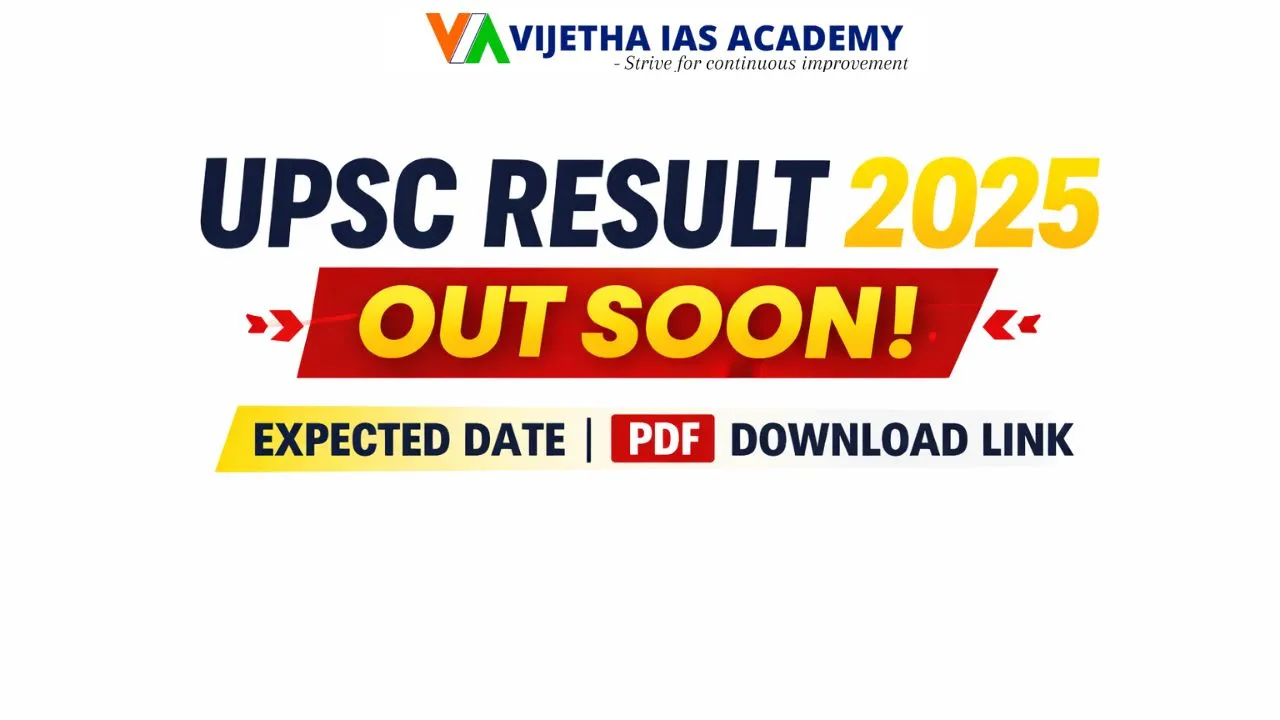
UPSC Result 2025: Expected Date, Download PDF Link
UPSC Result 2025: Expected Date, Download PDF Link
UPSC Result 2025 is expected to be released in the second week of April 2026 on the official website upsc.gov.in. Candidates who appeared for the Civil Services Examination 2025 are eagerly waiting for the final merit list. Based on previous year trends, the result is generally declared in April after completion of the Interview stage.
This article by Vijetha IAS Academy provides complete details about expected result date, PDF download link, topper list 2024, vacancy details, and what happens after the final result.
UPSC Result 2025 Expected Date
As per previous trends:
- UPSC CSE 2023 Final Result – 16 April 2024
- UPSC CSE 2024 Final Result – 22 April 2025
Following the same pattern, UPSC Final Result 2025 is expected in the second week of April 2026.
The result will be available in PDF format containing:
- Roll numbers
- Names of selected candidates
- Final rank
UPSC CSE 2025 Overview
|
|
|
|
|
|
|
|
|
|
|
|
|
|
|
|
|
|
|
|
|
|
|
|
|
|
|
|
|
|
UPSC Result 2025 PDF Download Link
Once released, candidates can download the UPSC Final Result 2025 PDF from:
- upsc.gov.in
- upsconline.nic.in
The PDF will include names and roll numbers of candidates who have cleared all three stages – Prelims, Mains, and Interview.
Steps to Download UPSC Result 2025 PDF
- Visit official website upsc.gov.in
- Click on “What’s New” section
- Select “UPSC Final Result 2025”
- Download the PDF
- Use CTRL+F to search your Roll Number or Name
UPSC Toppers List 2024
The UPSC Result 2024 was declared on 22 April 2025.
Shakti Dubey secured All India Rank 1 in UPSC CSE 2024.
Top 5 Rank Holders:
- Shakti Dubey
- Harshita Goyal
- Dongre Archit Parag
- Shah Margi Chirag
- Aakash Garg
These toppers have set an inspiring example for future aspirants preparing for UPSC 2026.
UPSC Vacancy 2025
Total expected vacancies: 979
Includes:
- 38 vacancies for Persons with Benchmark Disabilities (PwBD)
- Reservation for SC, ST, OBC, EWS as per government norms
Final numbers may change based on confirmation from Cadre Controlling Authorities.
What After UPSC Result 2025?
Candidates who clear the final merit list are appointed to prestigious services such as:
- IAS
- IPS
- IFS
- Other Group A & B services
Training Process
After selection:
- Foundation Course at Lal Bahadur Shastri National Academy of Administration
- IPS officers train at Sardar Vallabhbhai Patel National Police Academy
- IFS officers undergo diplomatic training in New Delhi
Service and cadre allocation depend on:
- Rank
- Service preference
- Category
- Vacancy availability
UPSC Cut Off Trends (2020–2024)
Cut-off marks vary every year based on:
- Difficulty level
- Number of candidates
- Vacancies
- Reservation policy
Analysing previous trends helps aspirants preparing for UPSC Notification 2026 to set a realistic target score.
Important for UPSC 2026 Aspirants
Candidates planning to appear in UPSC Notification 2026 must also check:
UPSC Age Limit
As per current rules:
- General Category: 21–32 years
- OBC: 21–35 years
- SC/ST: 21–37 years
- PwBD: Additional relaxation as per norms
Age is calculated as per the date mentioned in the official notification. Always verify eligibility before applying.
Conclusion
The UPSC Result 2025 is expected in April 2026 and will mark the final stage of the Civil Services Examination cycle. Aspirants awaiting results should simultaneously start preparing for upcoming opportunities, especially with the upcoming UPSC Notification 2026.
For expert guidance, strategy sessions, and structured preparation, stay connected with Vijetha IAS Academy.
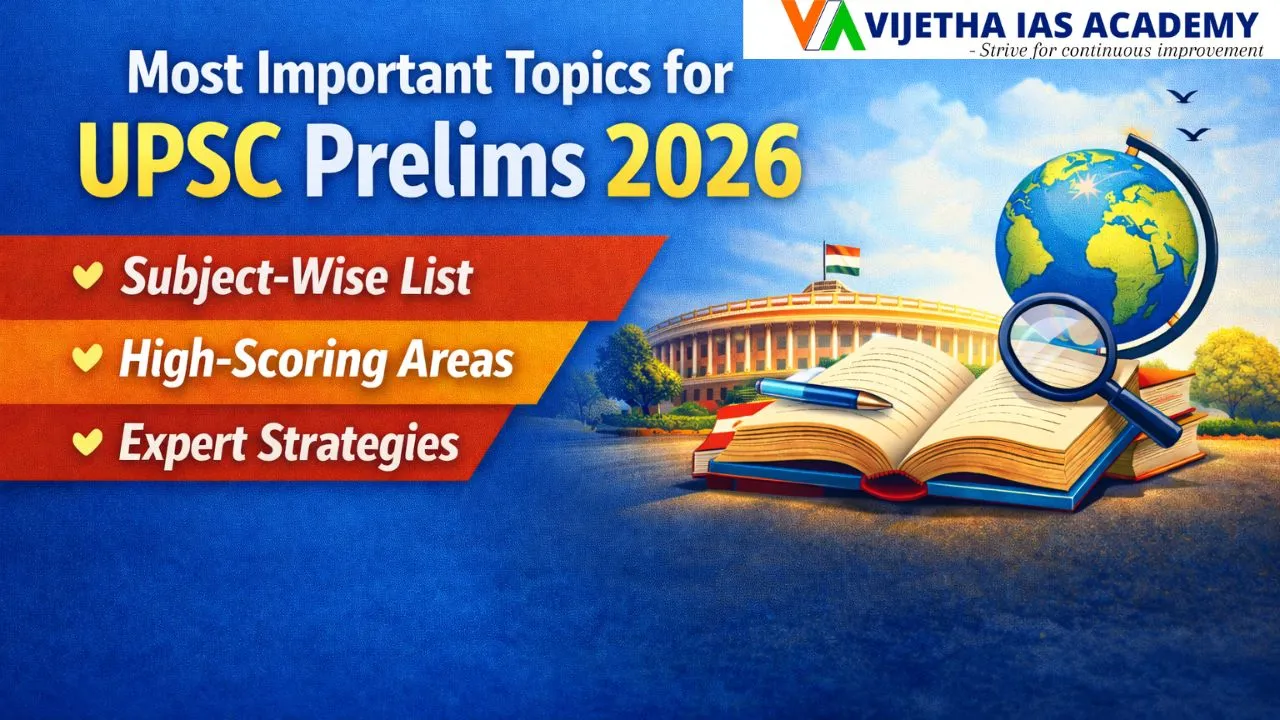
Most Important Topics for UPSC Prelims 2026: Subject-Wise High-Weightage List
Most Important Topics for UPSC Prelims 2026: Subject-Wise High-Weightage List
The Most Important Topics for UPSC Prelims 2026 are crucial for aspirants who want to maximise their score in the Civil Services Preliminary Examination conducted by the Union Public Service Commission.
As the exam approaches, students must shift from random preparation to focused revision of high-weightage areas. At Vijetha IAS Academy, we guide aspirants with a structured and exam-oriented strategy aligned with recent trends.
If you are preparing seriously, this subject-wise breakdown will help you identify what truly matters for UPSC Prelims 2026.
UPSC Prelims 2026 Exam Pattern Overview
The UPSC Prelims consists of:
- GS Paper I (200 marks)
- CSAT – GS Paper II (200 marks, qualifying – 33%)
Moreover, the paper is increasingly analytical and statement-based. Therefore, conceptual clarity and elimination skills are essential.
History – Important Topics for UPSC Prelims 2026
History remains a scoring yet unpredictable section. However, questions are now more culture-linked and analytical.
Ancient History (High Priority)
- Indus Valley Civilization (Sites, Features, Trade)
- Vedic Period – Sabha, Samiti, Varna system
- Mahajanapadas and Rise of Magadha
- Jainism & Buddhism
- Mauryan Empire – Ashokan Edicts
- Gupta Period – Science, Literature, Art
Medieval History
- Delhi Sultanate – Iqta System
- Mughal Administration – Mansabdari
- Bhakti & Sufi Movements
- Temple Architecture (Nagara, Dravida, Vesara)
Modern History (Very High Weightage)
- Revolt of 1857
- Socio-Religious Reform Movements
- Gandhian Movements
- Constitutional Developments (1773–1947)
Geography – Important Topics for UPSC Prelims 2026
Geography questions are increasingly map-based and linked to climate change.
Physical Geography
- Plate Tectonics
- Earthquakes & Volcanoes
- Monsoon Mechanism
- Ocean Currents
- El Niño & La Niña
Indian Geography (Very Important)
- Himalayan Rivers
- Soil Types of India
- Cropping Seasons
- Mineral Distribution
- Major Ports & Passes
Indian Polity – Most Important Topics
Polity is one of the most predictable sections.
Focus on:
- Fundamental Rights & DPSP
- Article 32, Article 368
- Constitutional Amendments
- Parliament Procedures
- Emergency Provisions
- Constitutional & Non-Constitutional Bodies
Furthermore, questions are often statement-based. Hence, reading Laxmikanth multiple times is essential.
Economy – Important Topics for UPSC Prelims 2026
Economy questions are concept-driven and current-linked.
Core Areas
- GDP & Inflation
- Fiscal Deficit
- Monetary Policy & RBI Tools
- Union Budget
- GST Structure
- Balance of Payments
In addition, link static topics with current affairs for better clarity.
Environment & Ecology – High Weightage Area
Environment has become a game-changer in recent Prelims.
Focus on:
- Biodiversity Hotspots
- IUCN Categories
- National Parks & Biosphere Reserves
- Climate Change Agreements
- Environmental Acts in India
Since many questions are current-based, revise government reports and international conventions carefully.
Science & Technology
Science questions are application-based.
Important Areas:
- ISRO Missions
- Biotechnology (CRISPR, mRNA)
- Artificial Intelligence
- Quantum Computing
- Defence Technology
CSAT Strategy (Do Not Ignore)
Although CSAT is qualifying, many serious aspirants fail due to negligence.
Focus on:
- Reading Comprehension
- Logical Reasoning
- Basic Numeracy
- Data Interpretation
Therefore, regular practice is non-negotiable.
How to Use These Important Topics for UPSC Prelims 2026
Merely knowing the important topics is not enough. Instead:
✔ Revise subject-wise
✔ Solve Previous Year Questions
✔ Attempt 40–50 Mock Tests
✔ Practice elimination techniques
Moreover, maintain balance between accuracy and attempts.
What to Avoid Before UPSC Prelims 2026
Many aspirants panic near the exam. However, avoid:
Starting new sources
Changing strategy at the last moment
Ignoring CSAT
Over-attempting mocks without analysis
For a structured roadmap, read our detailed UPSC Prelims 2026 Preparation Guide – What to Do and What to Avoid .
Also, check the eligibility criteria in our detailed guide on UPSC Age Limit before applying.
Final Words
The Most Important Topics for UPSC Prelims 2026 can significantly improve your score if prepared strategically. However, consistency and revision are the real keys to success.
At Vijetha IAS Academy, we provide structured mentorship, test series, and performance analysis designed specifically for UPSC 2026 aspirants.
Prepare smart. Revise strategically. Attempt confidently.
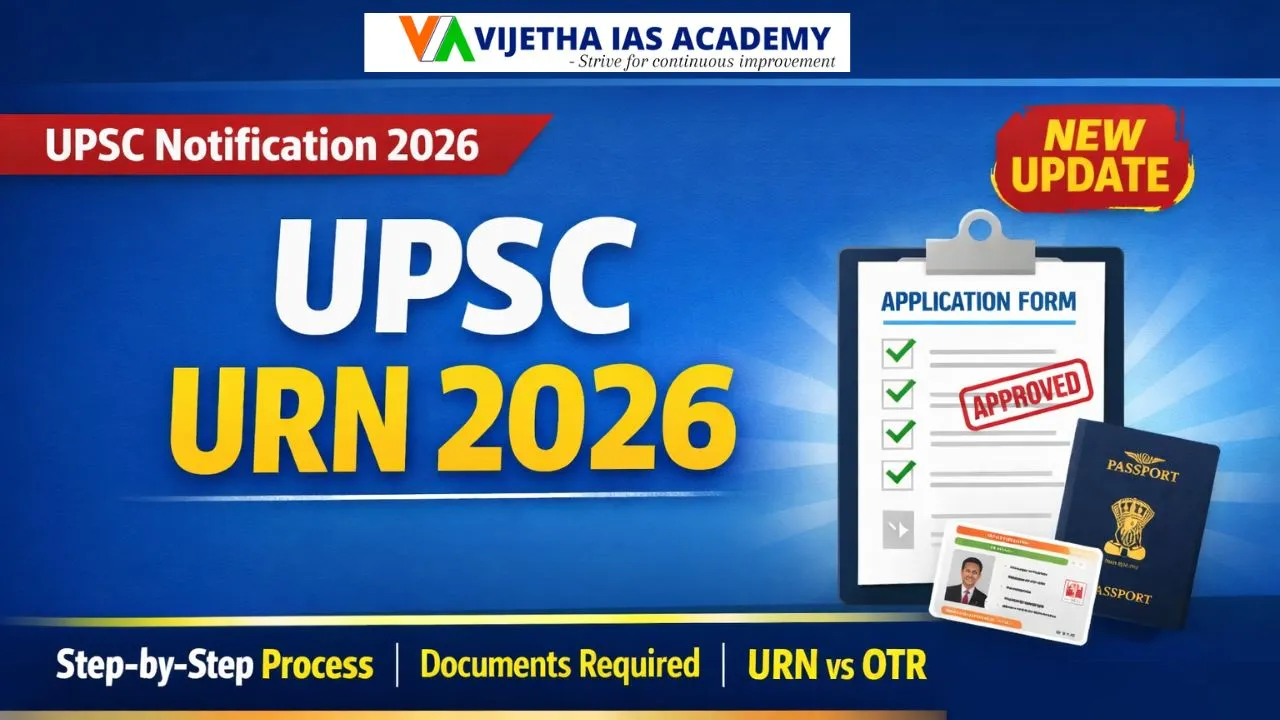
UPSC URN Registration 2026
UPSC URN Registration 2026: Process, Documents & URN vs OTR Guide
The UPSC URN Registration 2026 process is now mandatory for all aspirants applying for examinations conducted by the Union Public Service Commission. The newly introduced Universal Registration Number (URN) system replaces the earlier OTR (One-Time Registration) and provides candidates with a permanent digital identity for all UPSC exams.
As per the UPSC Notification 2026, the application window for UPSC CSE 2026 is open from 4 February 2026 to 24 February 2026. Candidates must complete their Universal Registration within this period to successfully apply.
At Vijetha IAS Academy, we strongly advise aspirants to complete their URN registration well in advance to avoid last-minute technical issues.
What is UPSC URN 2026?
The UPSC URN (Universal Registration Number) is a unique registration number generated after completing the Universal Registration process on the official UPSC portal.
It acts as a permanent ID for candidates across all UPSC examinations such as:
- Civil Services Examination (CSE)
- NDA & CDS
- Engineering Services
- Other recruitment exams conducted by UPSC
Full Form:
UPSC URN – Universal Registration Number
Once generated, the URN is required for:
- Filling the UPSC Application Form 2026
- Downloading UPSC Admit Card
- Checking exam updates
- Applying for future UPSC exams
UPSC URN Registration 2026: Important Dates
|
|
|
|
|
|
|
|
|
|
|
|
Before registering, candidates must carefully read the UPSC Notification 2026 and verify the latest UPSC age limit criteria.
UPSC URN vs OTR: What is the Difference?
The URN system has officially replaced the OTR system to improve transparency and verification.
|
|
|
|
|
|
|
|
|
|
|
|
|
|
|
|
|
|
|
|
|
|
|
|
|
|
|
|
Why UPSC Introduced URN?
- Reduces repeated data entry
- Ensures verified identity
- Minimises application errors
- Improves transparency
Steps to Fill UPSC Universal Registration 2026
The Universal Registration process is structured and must be completed carefully.
Step 1: Create UPSC Account
- Visit the official UPSC online portal
- Register using valid email ID and mobile number
- Verify using OTP
- Set a strong password
- Save login credentials safely
Step 2: Start Universal Registration
After login:
- Click on “Universal Registration”
- Read instructions carefully
- Keep required documents ready
Step 3: Complete Mandatory Profiles
1. Identity Profile
- Legal name
- Gender
- Date of birth
- Parent/guardian details
Ensure exact match with official documents.
2. Matriculation Profile
- 10th Board name
- Roll number
- Year of passing
This is used to verify eligibility and confirm compliance with the UPSC age limit.
3. Aadhaar / Photo ID Profile
- Aadhaar number (recommended)
- Or Passport / PAN / Voter ID
Important: Once submitted, details cannot be edited.
Step 4: Generate UPSC URN
- Review all details carefully
- Click “Lock and Submit”
- System generates your URN
- Use URN for all future UPSC applications
Documents Required for UPSC URN Registration 2026
Keep the following ready:
- Aadhaar Card (recommended)
- Passport / PAN / Voter ID
- 10th Class Certificate
- Recent passport-size photograph
- Scanned signature
- Active email ID and mobile number
Key Benefits of UPSC URN System
- Permanent registration number
- Secure digital identity
- Simplified application process
- Reduced chances of rejection
- Valid for all future UPSC exams
Final Advice from Vijetha IAS Academy
The UPSC URN Registration 2026 is the first and most important step in your UPSC journey. Since the profile gets permanently locked after submission, candidates must double-check all details before final submission.
Before applying:
- Read the UPSC Notification 2026 carefully
- Verify eligibility criteria
- Confirm the latest UPSC age limit
- Keep documents ready
For expert guidance, updated notifications, eligibility clarity, and structured preparation strategy for UPSC CSE 2026, stay connected with Vijetha IAS Academy.
